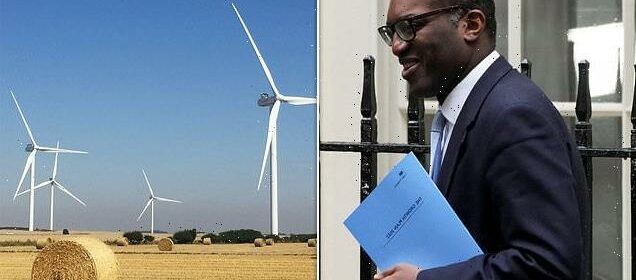Kwasi Kwarteng quietly lifts ban on new onshore wind farms

Kwasi Kwarteng quietly lifts ban on new onshore wind farms to allow turbines to be built in England as Chancellor breaks away from Boris Johnson’s stance to set up potential clash with Tory MPs
- Chancellor Kwasi Kwarteng quietly lifts de facto ban on new onshore wind farms
- He vows to ‘unlock the potential of onshore wind’ in his ’emergency Budget’
- Move is likely to anger Tory MPs who are opposed to new turbines in England
Chancellor Kwasi Kwarteng today quietly lifted the effective ban on new onshore wind farms as he set up a potential clash with Tory backbenchers.
In his ’emergency Budget’, which Mr Kwarteng dubbed a ‘Growth Plan’, the Chancellor vowed to ‘unlock the potential of onshore wind’.
He revealed planning rules for onshore wind turbines would be brought ‘in line’ with other infrastructure to allow it to be ‘deployed more easily in England’.
The move was not announced directly by Mr Kwarteng in the House of Commons, but was instead hidden within the 40-page ‘Growth Plan’ document that accompanied his statement to MPs.
The Chancellor’s decision to make the construction of onshore wind farms easier is part of ministers’ efforts to boost UK-based energy production and reduce the country’s reliance on foreign imports.
But it is likely to anger large numbers of Tory MPs and voters, some of whom hold concerns about the noise generated by wind turbines and consider them a blight on the landscape.
Kwasi Kwarteng revealed planning rules for onshore wind turbines would be brought ‘in line’ with other infrastructure to allow it to be ‘deployed more easily in England’
The Government today noted how ‘no new substantive onshore wind farm has received planning consent since 2015’
David Cameron, while he was prime minister, claimed the public had become ‘fed up’ with onshore wind farms and scrapped their Government subsidies.
At the time, Jacob Rees-Mogg – who is now Secretary of State for Business, Energy and Industrial Strategy – was among a group of Tory MPs to have urged Mr Cameron to slash the subsisidies.
Mr Cameron also tightened planning rules for onshore wind developments, with a requirement for more local consultation.
This was viewed as a de facto ban on new turbines, with the Government today noting how ‘no new substantive onshore wind farm has received planning consent since 2015’.
Earlier this year, prior to his ousting as PM, Boris Johnson was revealed to be planning to reverse the reforms brought in by Mr Cameron.
Mr Johnson later backtracked and promised not to introduce ‘wholesale changes’ to current planning rules amid a backlash from Tory MPs.
But Mr Kwarteng today signalled he would push forward with reforms as he vowed the Government would ‘unlock the potential of onshore wind by bringing consenting in line with other infrastructure’.
Jess Ralston, senior analyst at the Energy and Climate Intelligence Unit, welcomed today’s announcement.
She said: ‘Around eight in 10 people support onshore wind, so the ban has been a major anomaly in British energy policy given it’s both cheap and popular with the public.
‘So a decision to lift the ban suggests the new Government has listened to the experts and understands building more British renewables reduces our reliance on costly gas and so brings down bills.’
During the Tory leadership contest to replace Mr Johnson as PM, victor Liz Truss’s defeated rival Rishi Sunak had pledged to keep the ban on building any new onshore wind farms.
Source: Read Full Article

